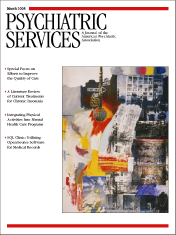Defining and Measuring Clinical Effectiveness in the Treatment of Schizophrenia
Abstract
OBJECTIVES: Expectations in treating schizophrenia are expanding beyond just controlling psychotic symptoms to include functional recovery. This report describes an approach to define and measure the clinical effectiveness of treatment in achieving these objectives. METHODS: A comprehensive literature review established that there is limited information about the meaning of the term "clinical effectiveness." To address this gap a consensus conference of schizophrenia researchers was held to consider the components of clinical effectiveness in real-world community practice and how these components can best be measured. RESULTS: The consensus of the researchers was that effective clinical treatment is characterized by four outcome domains: symptoms of disease, treatment burden, disease burden, and health and wellness. A clinical instrument to measure these four domains was constructed: Global Outcome Assessment of Life in Schizophrenia (GOALS). In using GOALS, clinicians rate each of the four domains on a scale of 1, very much improved, to 7, very much worse. Field-testing of this instrument is planned. CONCLUSIONS: Effective treatment interventions that combine optimal pharmacotherapy and targeted psychosocial treatments are raising expectations about the prospects of functional recovery among patients with schizophrenia. GOALS is proposed as one tool that can provide busy clinicians with a simple, objective measure of the effectiveness and outcomes of the clinical treatment they provide to patients with schizophrenia.



